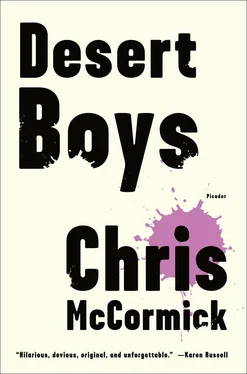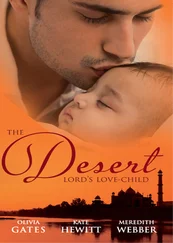Jean wiped her nose with the long bone of her thumb and cleared her throat into her thin orange scarf. Then it started to rain. And a minute later there was a downpour, and we couldn’t tell when it would be over. The two of us hopped from puddle to muddy puddle, amazed and then laughing at the sheer volume of rainwater coming down on us. We ducked into a small corner restaurant whose windows advertised falafel and yogurt sandwiches.
Other shelter seekers, a dozen of us, gathered in the little place. Most stayed at the windows, keeping an eye on the weather, waiting to push back out into the world. But Jean and I took stools at the counter and picked up menus.
The restaurant was called Habibi. At every wedding reception or party on our Armenian side of the family, a song by that name was played toward the end of the night, when the only people around to hear it were too drunk or happy or both to take offense at the word “Allah.” Habibi means “beloved.”
As Jean was talking, a disheveled man in his forties with graying shoulder-length hair and thick black eyebrows came out from the kitchen.
He had heard us, and now was looking us over: Jean, dark haired, tan skinned, large nosed like Mom; me, pale and blond, like Dad, with pink, chapped nostrils from an ongoing bout with a cold. The man wore a small gold crucifix that fell gently against his white polo. At his throat, three tattooed bars: red, blue, and orange, the Armenian flag.
His name was Simon. He told us that the owner—“a Turk, but a good one”—had the day off, leaving him in charge. Simon took our order, suggesting items along the way. “You don’t eat meat?” he asked Jean when she’d turned down three of his suggestions. Then, to me: “She doesn’t eat meat.”
He lopped generous scoops of hummus into a Styrofoam container and included two extra grape-leaf dolmas at no cost.
The storm outside began to look staged; rain and wind beat furiously against the windows. Through the steam in the glass you couldn’t see the rain, exactly, but you got an impression of it, its wild gray intensity. That blurring reminded me of Whistler’s painting Sea and Rain. Jean let me say this and, with the same leniency I’d given her earlier, didn’t call me pretentious.
Simon returned with two large folded white towels, one in each hand. He offered them to Jean and me. “Never eat wet,” he said. We rubbed the towels over our heads.
And when the lights flickered and the backup generator kicked in with a whir, and when the line cooks, bored, emerged from the kitchen and leaned against the counter facing the front windows, and when Simon took our towels and flung them to dry over two cheap stained-glass chandeliers — that’s when Jean began her story, and it was as if not only Simon and I were listening but also the line cooks and the shelter seekers who, even as they ignored us, looked back every now and again to distract themselves from the rain.
Since she was five years old, my sister said, she had a best friend named Emily Goodson. I knew Emily, but I didn’t know her well, so this would mostly be news to me.
After high school, when Jean left for college at UCLA, Emily stayed on in the Antelope Valley. UCLA was only an hour away, so Jean would come home some weekends, and she spent a lot of her summers back in the AV with Emily. They’d get into their bikinis and splay out in Emily’s backyard and act as if nothing were different from when they’d been bored teenagers so desperate for change that even a tan line made them feel like they had control, at least, over something. Only, things were different, of course, namely that Jean was only playacting as though she was happy to be home, and Emily wasn’t. For Emily, life in the Antelope Valley wasn’t something to escape. She was serving tables at Chili’s and taking classes here and there at the community college. With tips and a promotion, Emily was making decent money for a single woman in town, and the way she saw it, with Jean’s student loans piling up, she’d made the better choice by skipping university and staying home with her mother.
Our mother, who continued her whole life to exchange lipstick-kissed letters with her best friend in Armenia, must have seen herself in Jean and Emily’s friendship. This is the only reason we can come up with to explain why she made Emily the one exception to her rule that Jean couldn’t spend the night at anyone else’s house. Mom had no idea, of course, that Emily’s dad was addicted to methamphetamine. She would’ve died even earlier had she found out. Jean put two and two together only because Emily’s house always smelled like cleaning products but never looked clean. The Goodsons owned a pet iguana, and Jean used to pluck out the cigarette butts Emily’s dad tossed into the terrarium. Emily’s parents fought constantly — screaming at each other for hours into the night — and Jean rarely got any sleep. In the mornings, Emily wouldn’t look Jean in the face during breakfast, and then she’d apologize. But Jean always told her she never heard the fighting, told her she slept like a rock.
When Emily’s parents divorced, she moved in with her mom, a cake decorator at Albertsons. The two of them supported each other, and Jean couldn’t exactly blame Emily for staying in the Antelope Valley after high school. Still, Jean felt sorry for Emily. She even began to feel, secretly, superior.
Which was a first. All their lives, Emily had been better at everything. She was blond and big breasted, for one, in a town that seemed to appreciate that kind of thing. Jean, on the other hand, had always described herself as a hairy-armed, bespectacled, dark-skinned dork. (The most serious boyfriend she’d had, for God’s sake, turned out to be a skinhead.) Together Jean and Emily spent most of their adolescence at the mall, scouting for cute boys with skateboards, and Emily always ended up making out with someone in the photo booth at the arcade while his invariably nerdy friend killed time with Jean, aiming for 100s on the Skee-Ball ramp. On top of this, Jean wasn’t even the better nerd between them — Emily scored higher on every test and appeared in more club photos in the yearbook. She even started an animal rights group her junior year, leading protests at KFC, which, partly due to Emily’s looks, Jean suspected, were broadcast on local television. All of which is to say, Jean looked up to her friend, and sometimes, years later, when people asked about her early political life, Jean fibbed and used parts of Emily’s story as her own.
And so she was disappointed with Emily for doing what most girls in the Antelope Valley did: for staying in the desert, for not getting an education, for not using her intelligence and her passion and — yeah, sure — her good looks to make some major changes in the world. Emily would have been a better activist than Jean, probably. But there was Emily’s mother, newly single, and for that reason, Jean kept her disappointment to herself.
But then Emily’s mother remarried, purchased a cute and memorable domain name for her cake decorating service, and was getting along better than she ever had, and yet Emily still stayed. She got a new boyfriend, a twice-her-age engineer named — Jean couldn’t believe it — Gunnar. Gunnar set Emily up with an office job at Lockheed Martin or Northrop or Boeing — Jean could never remember which. The pay was three times what Emily was making at Chili’s, and when she moved into Gunnar’s brand-new, three-thousand-square-foot tract home, the first thing she did was she called Jean. Jean told her over the phone how great Emily’s new life was, how exciting, all while stifling the various moral questions being raised in her mind. Namely: (a) Emily’s contributions to suburban sprawl, (b) her work — even as a secretary — in the military — industrial complex, and (c) her decision to share her life with a man named Gunnar.
Читать дальше












